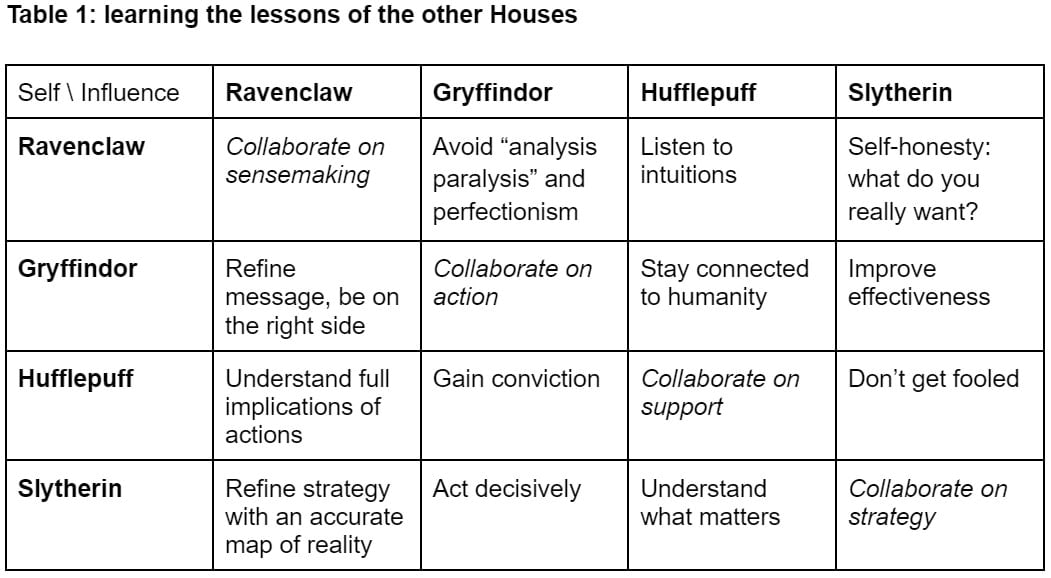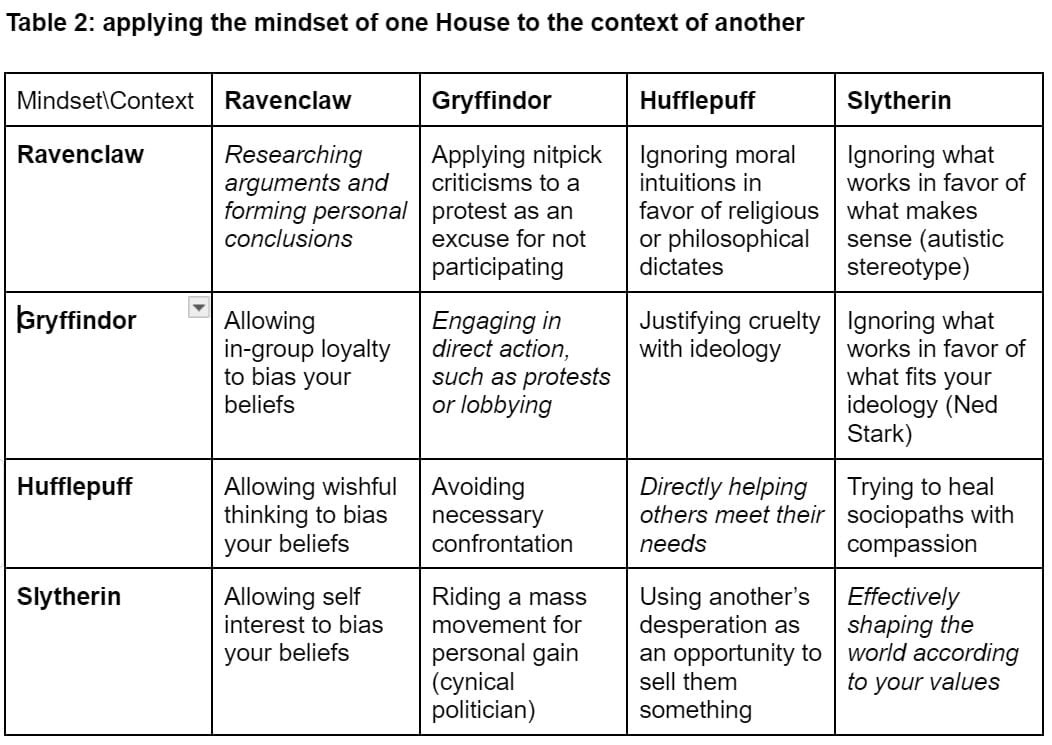Those engaged with questions of how to make the world a better place are probably all too familiar with the infighting that occurs among people who are on the same side of a political issue because of differences in methodology. Among those concerned about AI x-risk, for example, PauseAI activists sometimes criticize LessWrong and EA participants for endless, empty intellectualizing when so much is at stake. Meanwhile, writers of the latter groups criticize activists and protestors for oversimplifying and otherwise poisoning the discourse. This is a shame because mutual respect and understanding has the potential to strengthen both groups. To see the value that all earnestly engaged participants bring to the conversation, I find it helpful to understand people's disposition towards citizenship through the lens of Hogwarts' four houses:
Ravenclaw: values truth as the central good. Everyone is the hero of their own story, but sloppy or intentional distortions of the truth misalign the direction of their effort from what is truly beneficial, so a great deal of the world's problems would be alleviated if we could improve our individual and collective sensemaking. Ravenclaws are thus inclined to spend their time researching, writing, and conversing, seeking ever greater levels of rigor and nuance to observe and orient themselves and others towards an accurate as possible understanding of the world. Tends towards reason over intuition. Personal bias disclosure: I am very much a Ravenclaw.
Gryffindor: values courageous action as the central good. The world is locked in a constant struggle between right and wrong, where the latter is either acting out of self interest, misguidedness, or both. It's important to know that you are on the side of right, but once you are there, additional hand-wringing over process and minutia is just an excuse to do nothing and let the status quo continue to dominate the course of history. Personal bias disclosure: I have a hard time getting along with Gryffindors...but I've recently been gaining respect for them.
Hufflepuff: values kindness as the central good. Deep down in their hearts, people know right from wrong, but this intuition gets clouded by over-intellectualizing (Ravenclaw), ideology (Gryffindor), and self-centeredness (Slytherin). If you want the world to be a better place, just be kind to those around you, inspire others to do the same, and cultivate growth as it naturally occurs. Tends towards intuition over reason. Personal bias disclosure: my wife is a Hufflepuff and I have a soft spot for people of this sort.
Slytherin: values self actualization as the central good. Aware of the game-theoretic dynamics at play in all dimensions of social interaction. Respects the Great Game of Power and knows that those who ignore it are destined to lose and be made irrelevant. Suspicious of moralizing as being just another tactic in people's bids for power (virtue signaling). Understands that which is publicly touted as good is often different from that which is incentivized and that the latter is what really matters. Personal bias disclosure: I had a really hard time describing this disposition in a positive (or even value neutral) light.
Ideally, an effective actor in the social discourse should combine the best of all four houses. They should be continuously truth-seeking so that their efforts not only point them in the right direction, but also avoid pursuing narrow gains at the cost of the other causes via second-order effects. They should be capable of executing their best plans with vigor, even in the absence of perfect information. They should act from a place of wholesomeness, continuously anchored to deep intuitions of goodness. And they should be aware of the realities of power so that their strategies can have a chance of winning.
In reality, personal characteristics that are very difficult to change play a huge role in one's capabilities. One can and should seek self improvement, but it is vastly easier and more effective to leverage the power of collaboration. But collaboration is hard; it requires respect for and understanding of people who see the world in fundamentally different ways. Fixing breakdowns of collaboration is a highly individualized topic, but there are a few principles one can follow:
- Know thyself. Which House are you inclined towards? Which is most alien? This assessment will give you a starting point for determining your strengths, weaknesses, and personal biases, which in turn is relevant for knowing when to stand your ground in a disagreement vs. when to defer to the competencies of others.
- Respect your collaborators (and yourself). Recognize the value each approach brings and how each individual’s tendencies are reflections of their disposition. This can be difficult when you want something from them that does not match what they are inclined to give. In those moments, remind yourself of what they are good at. Even better, learn from these differences, as illustrated by Table 1.
- Stay in your lane. This does not mean that Ravenclaws should never act, Gryffindors should never research, and so on. The Houses are archetypes and any real person is some blend of each. When your context is of one House, however, your mindset should not be of another, as illustrated by Table 2.
- Stretch yourself, but stay humble. In particular relevance to AI safety, if you are natural Ravenclaw who has studied a lot of strategy and game theory, it can be very tempting to think you can go toe-to-toe with natural Slytherins on their home turf. Be careful with this! Even if they can't articulate theory as well as you can, they are using system 1 thinking to your system 2 and will likely run circles around you with such ease that it will look like dumb luck until you notice that it keeps happening.
Hard things require collaboration, which is powerful because it allows people to focus on their strengths while being supported in their weaknesses. However, collaboration also brings together different worldviews, making communication difficult. One way to improve communication is by building empathy, but doing so requires knowing what to pay attention to. Categories can help guide perception, but they should be seen as tools for understanding--not rigid boundaries that justify overlooking individuality.


Table 2's caption is confusing to read. I think this is because in most of what people write about around here, cross-context fusions are positively valenced by default, and “in the context of” doesn't quite capture the scenario. Something like “misapplying the mindset of one House while working for another” (emphasis on changes) would be much clearer.